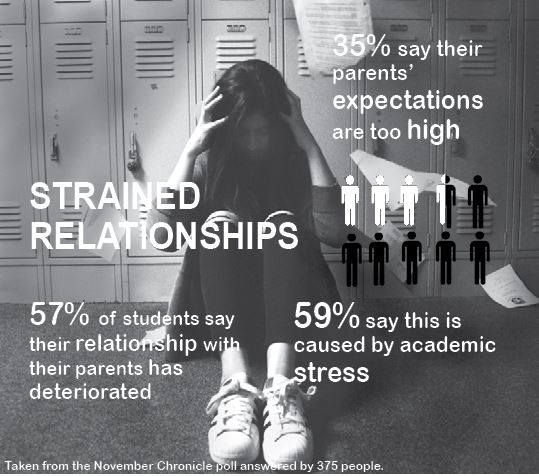Alone in his room, Justin* ’16 sat at his computer, typing furiously on his keyboard, when his mom walked in to check up on him.
“How are you doing?” she asked. “Do you want some water? Do you think you can finish on time? You should really get some sleep.”
Immediately, the angry thoughts began.
Why couldn’t she just leave him alone? Justin thought to himself. Couldn’t she see that he was busy? Why is she so nosy?
Justin’s sudden outburst of emotion resulted from tension between him and his parents.
Raging hormones, neurological development and a need to feel mature mix and easily induce friction between teenagers and their parents.
In a Chronicle poll of 377 Harvard-Westlake students, 57 percent responded that their relationship with their parents has become strained in recent years.
Fifty-nine percent attributed the deterioration to academic stress.
“The stress at this school can ruin relationships,” Justin said. “Students translate stress from school into anger towards parents, and parents become stressed from their children’s failure. Consequently, neither the parent nor child lives up to each other’s expectations.”
But pressure from the rigor and intensity of Harvard-Westlake is not lost on the parents.
“Kids who go to Harvard-Westlake understand that there is pressure at this school, and I believe they want to go to this school because they want to do well,” parent Claudio Ayestas (Jacqueline ‘17) said. “I understand the pressures of Harvard-Westlake, but there are also pressures in life, so you need to bring your best when you come to Harvard-Westlake.”
Not all students think academic stress to be the cause for a strain in parental relationships.
“I think the stress from [Harvard-Westlake] definitely does have an impact, but not more so than any other school,” Tony Ma ’17 said. “I think we all conflict with our parents on matters such as sleep and social networking.”

However, researchers have found that good relationships between parents and students are fundamental to a students’ success.
In general, teenagers who feel close to their parents have higher grade-point averages, are more likely to plan to go to college and are less likely to have ever been suspended from school, the Council of Economic Advisors, an executive agency that offers the President economic advice based on research, reported in 2000.
Marisa Hattler ’16 is one such student who said she has a positive relationship with her parents.
“Because I’m close with my parents, they have a better understanding of who I am and how hard I work, which makes them trust my effort,” Hattler said. “Because they aren’t always badgering me, I don’t feel the need to rebel and not do well like some of my peers feel.”
However, studies have shown that it is difficult for high school students and their parents to maintain good relationships.
A study led by behavioral geneticist Dr. Matt McGue found that “on average, the perceived quality of relationships between teenagers and their parents declined over the three years of the study along several dimensions.”
Especially now, during the digital age, even an age gap of a few years can hinder communication between two people.
Social media and technology have isolated 21st century teenagers from anyone who cannot compose a witty comment, complete with hashtags, in 140 characters or less.
In some cases, stress on students from parents wanting better grades, more extracurricular activities and higher awards have had fatal consequences.
In a recent article “The Silicon Valley Suicides,” the Atlantic Monthly highlights the clusters of student suicides at Henry M. Gunn High School in Palo Alto.
Gunn is ranked by U.S. News & World Report as one of the nation’s top five STEM schools.
However, it is also known as “the suicide school” to Palo Alto’s middle school kids, Hanna Rosin writes in the article.
She cites parental pressures as one reason for the suicides that happen there.
“The kids had internalized their parents’ priorities and didn’t know how to break free,” Rosin writes.

As for finding a way to decrease the strain in his relationship with his parents, Justin thinks that nothing can ameliorate the tensions caused by stress from schoolwork.
“To rid this tension would be to rid the academic rigor of institution, which serves as the foundation of the prestige of the school,” Justin said. “It is simply a part of attending such an esteemed school, and we must deal with it accordingly. There is nothing that can fix the situation.”
Parent Cecil McCabe (Austin ’16, Alex ’14) believes students themselves have the ability to remove pressure from their lives.
“I think [my son] can change his work habits to create a less hostile environment,” McCabe said.
Others believe that school-wide communication is the only solution, saying that this dialogue is crucial to the mental health of students, and consequently, their relationships with their parents.
“The school should be the one to tell parents that grades do not determine a students’ entire future, and that the child’s happiness is the most important thing,” Ali Iken ’17 said.
Junior Prefect Lexi Block ’17 agrees that there needs to be healthier communication.
“Having groups like Peer Support on campus provide a positive outlet for students and helps keep their stress levels low,” she said. “In addition, the kindness and understanding of teachers and deans is key to creating the best learning environment for students without it becoming too unmanageable.”
*Name has been changed.

































